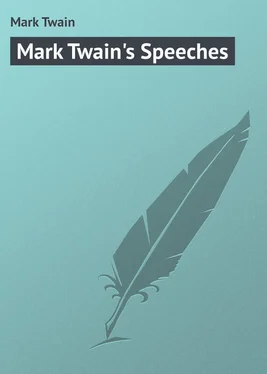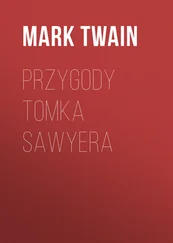Now there was another great man, I can’t think of his name either, who used to loaf around and watch the great chandelier in the cathedral at Pisa., which set him to thinking about the great law of gunpowder, and eventually led to the discovery of the cotton-gin.
Now, I don’t say this as an inducement for our young men to loaf around like Mr. Newton and Mr. Galileo and Captain Smith, but they were once little babies two days old, and they show what little things have sometimes accomplished.
The children of the Educational Alliance gave a performance of “The Prince and the Pauper” on the afternoon of April 14, 1907, in the theatre of the Alliance Building in East Broadway. The audience was composed of nearly one thousand children of the neighborhood. Mr. Clemens, Mr. Howells, and Mr. Daniel Frohman were among the invited guests.
I have not enjoyed a play so much, so heartily, and so thoroughly since I played Miles Hendon twenty-two years ago. I used to play in this piece ("The Prince and the Pauper”) with my children, who, twenty-two years ago, were little youngsters. One of my daughters was the Prince, and a neighbor’s daughter was the Pauper, and the children of other neighbors played other parts. But we never gave such a performance as we have seen here to-day. It would have been beyond us.
My late wife was the dramatist and stage-manager. Our coachman was the stage-manager, second in command. We used to play it in this simple way, and the one who used to bring in the crown on a cushion – he was a little fellow then – is now a clergyman way up high – six or seven feet high – and growing higher all the time. We played it well, but not as well as you see it here, for you see it done by practically trained professionals.
I was especially interested in the scene which we have just had, for Miles Hendon was my part. I did it as well as a person could who never remembered his part. The children all knew their parts. They did not mind if I did not know mine. I could thread a needle nearly as well as the player did whom you saw to-day. The words of my part I could supply on the spot. The words of the song that Miles Hendon sang here I did not catch. But I was great in that song.
[Then Mr. Clemens hummed a bit of doggerel that the reporter made out as this:
“There was a woman in her town,
She loved her husband well,
But another man just twice as well.”
“How is that?” demanded Mr. Clemens. Then resuming]
It was so fresh and enjoyable to make up a new set of words each time that I played the part.
If I had a thousand citizens in front of me, I would like to give them information, but you children already know all that I have found out about the Educational Alliance. It’s like a man living within thirty miles of Vesuvius and never knowing about a volcano. It’s like living for a lifetime in Buffalo, eighteen miles from Niagara, and never going to see the Falls. So I had lived in New York and knew nothing about the Educational Alliance.
This theatre is a part of the work, and furnishes pure and clean plays. This theatre is an influence. Everything in the world is accomplished by influences which train and educate. When you get to be seventy-one and a half, as I am, you may think that your education is over, but it isn’t.
If we had forty theatres of this kind in this city of four millions, how they would educate and elevate! We should have a body of educated theatre-goers.
It would make better citizens, honest citizens. One of the best gifts a millionaire could make would be a theatre here and a theatre there. It would make of you a real Republic, and bring about an educational level.
On November 19, 1907, Mr. Clemens entertained a party of six or seven hundred of his friends, inviting them to witness the representation of “The Prince and the Pauper,” flayed by boys and girls of the East Side at the Children’s Educational Theatre, New York.
Just a word or two to let you know how deeply I appreciate the honor which the children who are the actors and frequenters of this cozy playhouse have conferred upon me. They have asked me to be their ambassador to invite the hearts and brains of New York to come down here and see the work they are doing. I consider it a grand distinction to be chosen as their intermediary. Between the children and myself there is an indissoluble bond of friendship.
I am proud of this theatre and this performance – proud, because I am naturally vain – vain of myself and proud of the children.
I wish we could reach more children at one time. I am glad to see that the children of the East Side have turned their backs on the Bowery theatres to come to see the pure entertainments presented here.
This Children’s Theatre is a great educational institution. I hope the time will come when it will be part of every public school in the land. I may be pardoned in being vain. I was born vain, I guess. [At this point the stage-manager’s whistle interrupted Mr. Clemens.] That settles it; there’s my cue to stop. I was to talk until the whistle blew, but it blew before I got started. It takes me longer to get started than most people. I guess I was born at slow speed. My time is up, and if you’ll keep quiet for two minutes I’ll tell you something about Miss Herts, the woman who conceived this splendid idea. She is the originator and the creator of this theatre. Educationally, this institution coins the gold of young hearts into external good.
[On April 23, 1908, he spoke again at the same place]
I will be strictly honest with you; I am only fit to be honorary president. It is not to be expected that I should be useful as a real president. But when it comes to things ornamental I, of course, have no objection. There is, of course, no competition. I take it as a very real compliment because there are thousands of children who have had a part in this request. It is promotion in truth.
It is a thing worth doing that is done here. You have seen the children play. You saw how little Sally reformed her burglar. She could reform any burglar. She could reform me. This is the only school in which can be taught the highest and most difficult lessons – morals. In other schools the way of teaching morals is revolting. Here the children who come in thousands live through each part.
They are terribly anxious for the villain to get his bullet, and that I take to be a humane and proper sentiment. They spend freely the ten cents that is not saved without a struggle. It comes out of the candy money, and the money that goes for chewing-gum and other necessaries of life. They make the sacrifice freely. This is the only school which they are sorry to leave.
Mr. Clemens was one of the speakers at the Lotos Club dinner to Governor Odell, March 24, 1900. The police problem was referred to at length.
Let us abolish policemen who carry clubs and revolvers, and put in a squad of poets armed to the teeth with poems on Spring and Love. I would be very glad to serve as commissioner, not because I think I am especially qualified, but because I am too tired to work and would like to take a rest.
Howells would go well as my deputy. He is tired too, and needs a rest badly.
I would start in at once to elevate, purify, and depopulate the red-light district. I would assign the most soulful poets to that district, all heavily armed with their poems. Take Chauncey Depew as a sample. I would station them on the corners after they had rounded up all the depraved people of the district so they could not escape, and then have them read from their poems to the poor unfortunates. The plan would be very effective in causing an emigration of the depraved element.
Читать дальше












